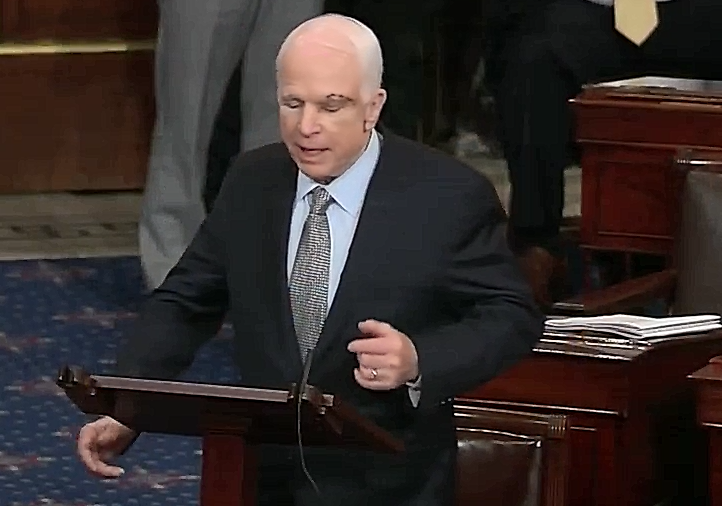Shortly after Sen. John McCain’s hero’s return to the U.S. Senate, where he cast a decisive vote on the motion to proceed to the House-passed Obamacare repeal and replace legislation after being diagnosed with life-threatening brain cancer, McCain then took to the floor to trash the entire process.
In a floor speech, McCain touted a “bipartisan” route to replacing the health care law and a “return to regular order,” drawing cheers from the chamber’s Democrats. He also blasted Senate Majority Leader Mitch McConnell (R-Ky.) for attempting to, in McCain’s words, “force the legislation past a unified opposition.”
“I don’t think that’s going to work in the end, and probably shouldn’t,” McCain said, adding, “We’re getting nothing done.”
In doing so, McCain all but invited Senate Minority Leader Chuck Schumer (D-N.Y.) to rewrite the nation’s health care law by making the standard for it to pass be that some Democrats support it — even as he bemoaned the fact that Obamacare was enacted without a single Republican supporting it.
“This means Senate Republicans abandoning budget reconciliation as a vehicle for repealing and replacing Obamacare and its 51-vote threshold and instead turning the Senate over to Schumer,” Americans for Limited Government President Rick Manning noted in statement.
Ironically, the one accomplishment touted by McCain — confirming Neil Gorsuch to the Supreme Court — required Senate Republicans to abolish the judicial filibuster once and for all by lowering the threshold to confirm to 51 votes.
Senate Leadership sources have told conservative leaders that the only way to get a bipartisan bill would be if it were restricted to being nothing more than a bailout for insurance companies without ending the individual and employer mandates, Medicaid expansion or the insurance regulations.
Of course, Obamacare itself was a bailout for insurance companies in the first place.
Employer provided coverage has not grown at all since 2007, when 158 million were covered by employer-provided insurance, according to data compiled by the Kaiser Family Foundation. 156 million had such coverage in 2015. Employer coverage fell from 53 percent of the population to 49 percent amid the recession and dropping employment population ratios for working age adults, accounting for 10 million people who would have had employer-based health insurance had the rate remained the same.
In the meantime, the individual insurance market grew from 14.5 million in 2007 to 21.8 million today, per Kaiser. This change occurred as employers laid off workers in the recession and after Obamacare became law, stopped providing employer-provided coverage at the same rate, forcing millions more into individual markets via the individual mandate and taxpayer subsidies. That was the bailout. Obamacare was just a way to give insurers a way to force the American people to buy their product. Even still, there are states where there are almost no alternative options available on insurance markets.
Why would we want to do that all over again?
In embracing a “bipartisan,” “regular order” approach to addressing this broken government mandated insurance system — apparently requiring a 60-vote threshold if it were occur outside the budget reconciliation process — McCain wants to reward Democrats with another shot at writing health care law rather than restoring competition and bringing down premiums with market-based solutions.
If there is a silver lining, it is that now that we are on the legislation finally, once there are GOP-offered amendments that are voted down one-by-one by Democrats, it will be clear that the only bipartisanship supported by Democrats are votes on their preferred amendments.
Leaving but two options. Keeping Obamacare, with the support of Democrats, or leaving it behind, without them.
Unfortunately, Senate Republicans’ first bid to replace Obamacare, the Better Care Act, as McCain predicted, lacked the votes, failing 43 to 57, with nine Republicans voting no.
For what it’s worth, McCain voted yes; he’s not even the biggest problem. The proposal included an amendment by Sen. Ted Cruz (R-Texas) that would have allowed insurers to sell lower-cost plans to the American people. Didn’t Republicans campaign on bringing down premiums? The Cruz amendment would have given consumers more options on insurance markets. Perhaps those nine senators have a better plan to bring down premiums.
It should be noted that the House struggled similarly, and eventually came to a consensus that enjoyed support from all sides of the Republican Conference.
Other amendments will include the 2015 Obamacare partial repeal that passed both houses of Congress and was vetoed by former President Barack Obama, but that is thought to lack the votes as well.
We are on the bill but now what? Without an apparent consensus for a replacement bill or even repeal, the Senate looks lost in its efforts to find a health care answer.
In meantime, President Donald Trump is taking his message on the road, rallying his supporters in Youngstown, Ohio. Touting the motion to proceed in the Senate, Trump declared to cheers, “We’re now one step closer from liberating our citizens from this Obamacare nightmare and delivering great health care for the American people.”
After four consecutive elections that were largely referenda against Obamacare, with Republicans successively picking up the House, Senate and finally the White House, failure to respond to constituents’ concerns would be a betrayal of the first order. For his part, Trump is delivering the American people in critical states that have created this historic moment for Congressional Republicans to be able to act on the nation’s broken health care system. If they cannot deliver, the blame will fall at their feet in 2018, not the President’s.
Robert Romano is the senior editor of Americans for Limited Government.







